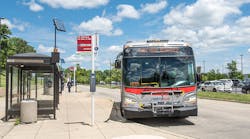Washington Metropolitan Area Transit Authority (WMATA) has updated some details of its transition to a zero-emission bus fleet while it continues to develop its Transition Plan, which lays out a phased approach and associated costs for investment in fleet, facilities, internal workforce and operations to support a zero-emission bus service.
Updated information shared includes how the agency will transition to a zero-emission bus fleet by 2045 including testing and evaluation, infrastructure and facility upgrades and procurement efforts.
WMATA’s Board approved in June 2021 the agency’s transition to a 100 percent zero-emission bus fleet by 2045, with a full transition to electric or other zero-emission bus purchases by 2030. WMATA says it will need $1-2 billion in capital investment over more than 20 years to meet the transition target.
WMATA expects to purchase 12 electric buses and associated charging equipment in 2022 as part of its Battery-Electric Bus Test and Evaluation Program, which is supported with a $4.2-million Federal Transit Administration grant. The buses will begin arriving in late 2022 and are anticipated to enter service out of the Shepherd Parkway Bus Division in 2023. WMATA will assess the interoperability of the buses with charging infrastructure from multiple manufacturers and evaluate performance in real world conditions for up to 12 months.
“A more sustainable bus program is important to the region’s environmental goals, and the Board continues to look for opportunities with our partner jurisdictions and utilities to accelerate the timelines without compromising service,” said Metro Board Chair Paul C. Smedberg. “We continue to actively pursue grants that would help support the program and move Metrobus closer to a zero-emission future.”
WMATA will begin a transition period next year where the purchase of diesel buses will end and new vehicle procurements will be a mix of low- or zero-emission buses. All new buses entering service by 2030 will be electric or other zero-emission technology.
Beyond purchasing buses, this transition will require purchasing and installing charging equipment, training and workforce development, among other investments. The Northern and Bladensburg bus garages are undergoing redevelopment and will be designed to support electric buses – Northern will reopen in 2026 with the infrastructure and equipment needed to support 150 electric buses. At the same time, WMATA is engaging with regional utilities to plan and invest in the grid infrastructure to provide the needed power to these facilities.
“We are committed to pursuing the work necessary for the Metrobus fleet, facilities and workforce to make the transition for zero-emission technology as quickly as possible,” said WMATA Director of Zero-Emission Vehicles Amy Mesrobian. “This will require a coordinated effort among Metro, our jurisdictional partners and regional utilities to build the infrastructure and facilities before we can operate an electric fleet.”
![WMATA is targeting 2045 to have its fleet fully transitioned to zero emissions. [image: WMATA] WMATA is targeting 2045 to have its fleet fully transitioned to zero emissions. [image: WMATA]](https://img.masstransitmag.com/files/base/cygnus/mass/image/2022/05/16x9/WMATA_Busbypowerstation.626f32f018ceb.png?auto=format,compress&fit=max&q=45&w=250&width=250)




